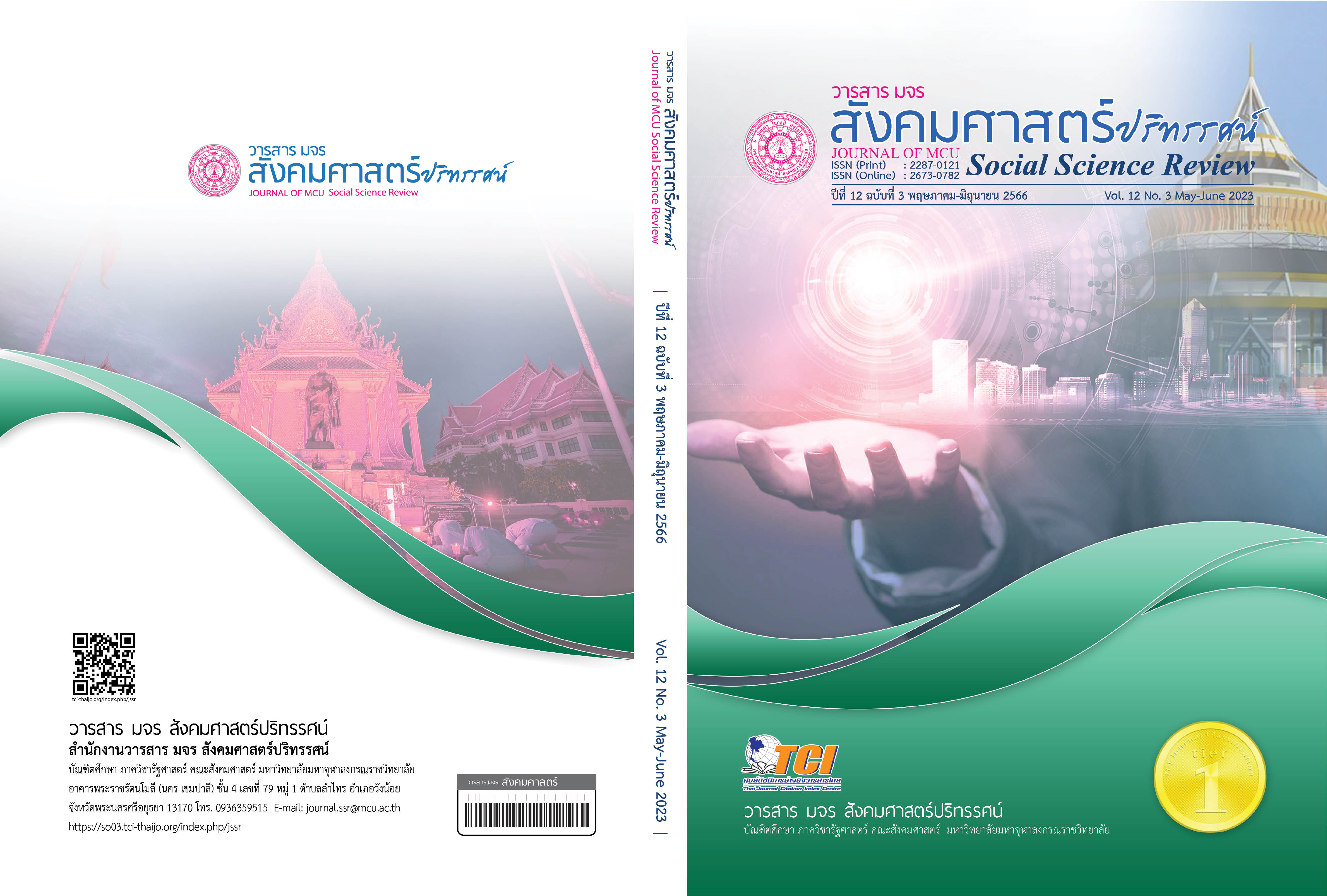การพัฒนาสมรรถนะเชิงพุทธเพื่อการเรียนรู้เทคโนโลยีดิจิทัล ของบุคลากรศาลปกครอง
คำสำคัญ:
การพัฒนาสมรรถนะ, การเรียนรู้เชิงพุทธ, เทคโนโลยีดิจิทัลบทคัดย่อ
บทความวิจัยนี้มีวัตถุประสงค์ เพื่อศึกษาการพัฒนาสมรรถนะเชิงพุทธเพื่อการเรียนรู้เทคโนโลยีดิจิทัลของบุคลากรศาลปกครอง เป็นการวิจัยแบบผสานวิธี การวิจัยเชิงปริมาณโดยแจกแบบสอบถามกับบุคลากรศาลปกครองซึ่งเป็นกลุ่มตัวอย่างจำนวน 338 คน และ การวิจัยเชิงคุณภาพ โดยการสัมภาษณ์เชิงลึก ผู้ให้ข้อมูลสำคัญจำนวน 18 รูปหรือคน
ผลการวิจัยพบว่า 1. ระดับการพัฒนาสมรรถนะเพื่อการเรียนรู้เทคโนโลยีดิจิทัลของบุคลากรศาลปกครองโดยภาพรวมอยู่ในระดับมาก (=3.79) เมื่อพิจารณาเป็นรายด้านพบว่า อยู่ในระดับมากทุกด้านตามลำดับค่าเฉลี่ย คือ ด้านคุณสมบัติส่วนตัว (
=4.02) ด้านมโนทัศน์เกี่ยวกับตนเอง (
=3.86) ด้านแรงจูงใจ (
=3.86) ด้านความรู้ (
=3.64) และด้านทักษะ (
=3.59) 2. การพัฒนาสมรรถนะเชิงพุทธเพื่อการเรียนรู้เทคโนโลยีดิจิทัลของบุคลากรศาลปกครอง สามารถนำหลักปัญญา 3 ได้แก่ สุตมยปัญญา (การเรียนรู้) จินตามยปัญญา (การทบทวน) และ ภาวนามยปัญญา (การปฏิบัติ) มาประยุกต์ใช้ในการบริหารงาน โดยเฉพาะหลักปัญญา 3 ด้านภาวนามยปัญญา (การปฏิบัติ) ศาลปกครองจะต้องกำหนดเป็นนโยบายและแนวทางปฏิบัติในการฝึกอบรมบุคลากรศาลปกครองทุกระดับเพื่อให้มีการปฏิบัติอย่างเข้มข้นในทุกหลักสูตร
เอกสารอ้างอิง
ชญณา ศิริภิรมย์. (2566). หลักพละ 4 : สำหรับการพัฒนาสมรรถนะของบุคลากรในองค์กร. วารสารสหวิทยาการนวัตกรรมปริทรรศน์, 6(2), 1-11.
ส่วนนโยบายรัฐบาลอิเล็กทรอนิกส์ ฝ่ายนโยบายและยุทธศาสตร์ สำนักงานอิเล็กทรอนิกส์ องค์การมหาชน. (2560). แผนพัฒนารัฐบาลดิจิทัลของประเทศไทย พ.ศ. 2560 – 2564.กรุงเทพฯ: บริษัท โบลลิเกอร์ แอนด์ คอมพานี ประเทศไทย จำกัด.
ศาลปกครอง. (2560). แผนแม่บทศาลปกครอง ระยะ 20 ปี พ.ศ. 2560 – 2580. สืบค้น 22 ธันวาคม 2563, จาก http://admincourt.go.th/admincourt.
พระมหากฤษฎา กิตฺติโสภโณ. (2564, 30 ธันวาคม) อาจารย์ประจำหลักสูตรบัณฑิตศึกษา สาขาวิชารัฐประศาสนศาสตร์ [บทสัมภาษณ์].
อรรถพล เสือคำรณ. (2565). การพัฒนาสมรรถนะการบริหารงานที่ดีขององค์กรตามหลักอิทธิบาทธรรม. วารสารสหวิทยาการนวัตกรรมปริทรรศน์, 5(2), 199-209.
พระครูวิธานธรรมสุนทร (บังเอิญ พลวโร). (2566). การพัฒนาองค์กรตามแนวพุทธ : กรณีศึกษา แนวคิดการสร้างโซล่าเซลล์ของเจ้าคุณเสียดายแดด (พระปัญญาวชิรโมลี) เจ้าอาวาสวัดป่าศรีแสงธรรม. วารสารพุทธนวัตกรรมและการจัดการ, 6(2), 169-183.
ดาวน์โหลด
เผยแพร่แล้ว
รูปแบบการอ้างอิง
ฉบับ
ประเภทบทความ
สัญญาอนุญาต
ลิขสิทธิ์ (c) 2023 วารสาร มจร สังคมศาสตร์ปริทรรศน์

อนุญาตภายใต้เงื่อนไข Creative Commons Attribution-NonCommercial-NoDerivatives 4.0 International License.
เพื่อให้เป็นไปตามกฎหมายลิขสิทธิ์ ผู้นิพนธ์ทุกท่านต้องลงลายมือชื่อในแบบฟอร์มใบมอบลิขสิทธิ์บทความให้แก่วารสารฯ พร้อมกับบทความต้นฉบับที่ได้แก้ไขครั้งสุดท้าย นอกจากนี้ ผู้นิพนธ์ทุกท่านต้องยืนยันว่าบทความต้นฉบับที่ส่งมาตีพิมพ์นั้น ได้ส่งมาตีพิมพ์เฉพาะในวารสาร มจร สังคมศาสตร์ปริทรรศน์ เพียงแห่งเดียวเท่านั้น หากมีการใช้ภาพหรือตารางหรือเนื้อหาอื่นๆ ของผู้นิพนธ์อื่นที่ปรากฏในสิ่งตีพิมพ์อื่นมาแล้ว ผู้นิพนธ์ต้องขออนุญาตเจ้าของลิขสิทธิ์ก่อน พร้อมทั้งแสดงหนังสือที่ได้รับการยินยอมต่อบรรณาธิการ ก่อนที่บทความจะได้รับการตีพิมพ์ หากไม่เป็นไปตามข้อกำหนดเบื้องต้น ทางวารสารจะถอดบทความของท่านออกโดยไม่มีข้อยกเว้นใดๆ ทั้งสิ้น





